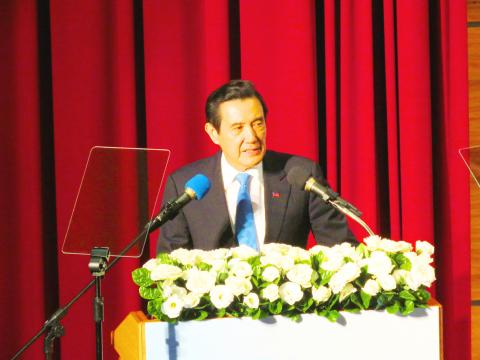The Ma Ying-jeou Foundation yesterday held a policy forum on the future of cross-strait relations to mark the third anniversary of the historic meeting between then-president Ma Ying-jeou (馬英九) and Chinese President Xi Jinping (習近平) in Singapore in 2015.
It was the first time in 66 years leaders of the two sides in the Chinese Civil War had met since the retreat of the Chinese Nationalist Party (KMT) regime to Taiwan in 1949.
At the forum, Ma said that the “1992 consensus” was an actual political accord between Taiwan and China.

Photo: CNA
President Tsai Ing-wen’s (蔡英文) administration’s refusal to recognize the consensus is tantamount to unilaterally abolishing the accord, Ma said.
The “1992 consensus,” a term former Mainland Affairs Council chairman Su Chi (蘇起) in 2006 admitted making up in 2000, refers to a tacit understanding between the KMT and the Chinese government that both sides of the Taiwan Strait acknowledge there is “one China,” with each side having its own interpretation of what “China” means.
Ma said the Tsai administration does not seem to understand that the consensus is a mark of trust, and without it cross-strait relations are deteriorating, leading to a complete standstill in quasi-governmental interactions and affecting Taiwan’s economy, politics and diplomacy.
Declining Chinese tourists numbers, the inability to sell Taiwanese produce in China and increased Chinese pressure on international organizations are all examples of how Taiwan is being affected, Ma said.
He also criticized the Tsai administration for failing to come up with an alternative to the consensus.
Ma called on Beijing not to attack the formula of “one China, with different interpretations,” saying that the existence of the ROC is the only thing preventing the realization of Taiwanese independence.
The acknowledgment that there is “one China” is crucial to preventing Taiwanese independence, Ma added.
The eventuality of unification is stated in the preface of the ROC Constitution, although it lacks a time line, Ma said.
The preface to the amendments in the Constitution states: “To address needs prior to the country’s unification, we have made the amendments to the Constitution as follows,” he said.
Any deal on unification should be conducted democratically, peacefully and take time, but such prerequisites have yet to be met, Ma said.
Taiwan should remain open to the possibility of unification, should not endorse independence and should call on China to avoid the use of force, Ma said.
The two sides must work toward a mutually agreed resolution, as reliance on any third party could bring negative effects, he said, adding that the US and Japan understand this possibility well.
Ma said that any cross-strait policy — regardless of political party — proposed during the 2020 presidential electoral campaign must stand up to public scrutiny.
Political parties owe it to the people to propose policies that discuss the direction of cross-strait relations, identify potential problems and provide viable solutions, Ma said.

Alain Robert, known as the "French Spider-Man," praised Alex Honnold as exceptionally well-prepared after the US climber completed a free solo ascent of Taipei 101 yesterday. Robert said Honnold's ascent of the 508m-tall skyscraper in just more than one-and-a-half hours without using safety ropes or equipment was a remarkable achievement. "This is my life," he said in an interview conducted in French, adding that he liked the feeling of being "on the edge of danger." The 63-year-old Frenchman climbed Taipei 101 using ropes in December 2004, taking about four hours to reach the top. On a one-to-10 scale of difficulty, Robert said Taipei 101

Nipah virus infection is to be officially listed as a category 5 notifiable infectious disease in Taiwan in March, while clinical treatment guidelines are being formulated, the Centers for Disease Control (CDC) said yesterday. With Nipah infections being reported in other countries and considering its relatively high fatality rate, the centers on Jan. 16 announced that it would be listed as a notifiable infectious disease to bolster the nation’s systematic early warning system and increase public awareness, the CDC said. Bangladesh reported four fatal cases last year in separate districts, with three linked to raw date palm sap consumption, CDC Epidemic Intelligence

Two Taiwanese prosecutors were questioned by Chinese security personnel at their hotel during a trip to China’s Henan Province this month, the Mainland Affairs Council (MAC) said yesterday. The officers had personal information on the prosecutors, including “when they were assigned to their posts, their work locations and job titles,” MAC Deputy Minister and spokesman Liang Wen-chieh (梁文傑) said. On top of asking about their agencies and positions, the officers also questioned the prosecutors about the Cross-Strait Joint Crime-Fighting and Judicial Mutual Assistance Agreement, a pact that serves as the framework for Taiwan-China cooperation on combating crime and providing judicial assistance, Liang

US climber Alex Honnold left Taiwan this morning a day after completing a free-solo ascent of Taipei 101, a feat that drew cheers from onlookers and gained widespread international attention. Honnold yesterday scaled the 101-story skyscraper without a rope or safety harness. The climb — the highest urban free-solo ascent ever attempted — took just more than 90 minutes and was streamed live on Netflix. It was covered by major international news outlets including CNN, the New York Times, the Guardian and the Wall Street Journal. As Honnold prepared to leave Taiwan today, he attracted a crowd when he and his wife, Sanni,